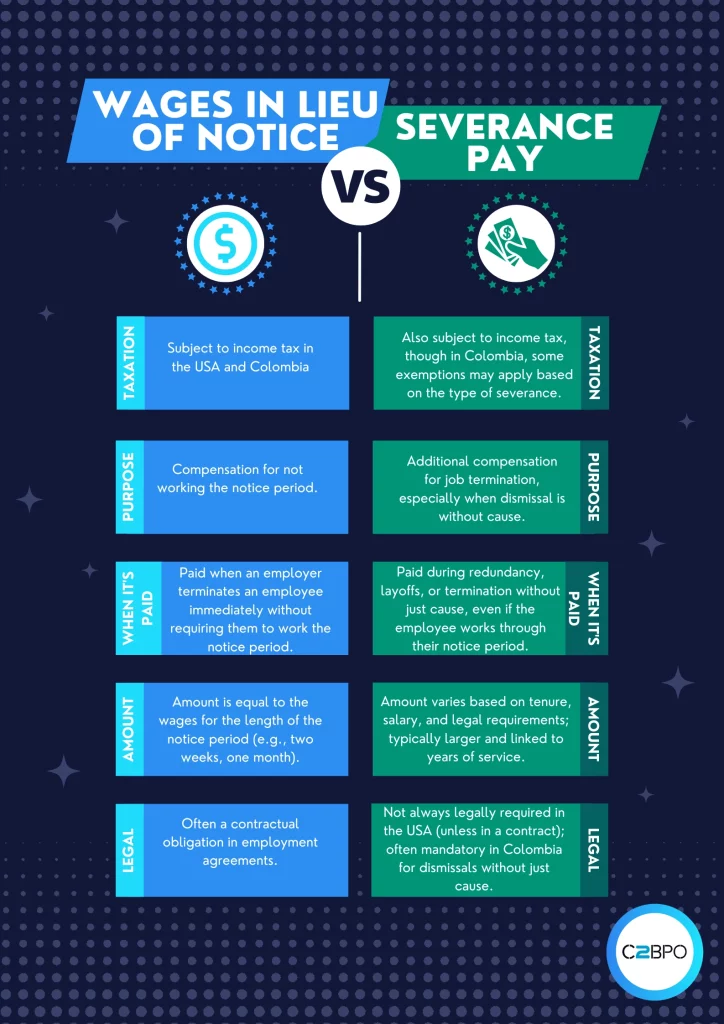Wages in lieu of notice, also known as Payment in Lieu of Notice (PILON), refers to the compensation an employer gives to an employee when they are terminated immediately, without being required to serve out their notice period. Instead of working during the notice period, the employee receives a lump sum equivalent to their expected wages for that time.
PILON is a practical solution for employers who must terminate an employment contract swiftly while ensuring the employee receives fair compensation for their expected notice period. The laws and regulations around PILON vary between countries, with specific distinctions between the United States and Colombia.
When is Payment in Lieu of Notice Used?
PILON is typically used when an employer needs to end an employment contract immediately without requiring the employee to serve out their notice period. Common situations where PILON is used include:
- Redundancy or layoffs: When companies restructure or downsize.
- Breach of contract: In cases where trust between the employer and employee has broken down.
- Mutual agreements: In cases where both parties agree that working the notice period is unnecessary or unproductive.
In the United States, employment is often “at-will,” meaning that either party can end the employment without notice unless a contract specifies otherwise. When contracts do specify notice periods, PILON may be offered as an alternative. In Colombia, PILON is more structured under employment law, as the termination process generally requires justification, and statutory notice periods must be observed, or payment must be made in lieu of notice.
How Does Wages in Lieu of Notice Work?
When an employer chooses to provide in Lieu of notice pay, the employee typically receives a lump sum equal to the wages they would have earned during the notice period. This ensures that the employee is compensated fairly, even though they are no longer required to work.
In the United States, the terms of PILON are generally dictated by the employment contract, which can outline how much is owed and when it should be paid. If no specific contract terms exist, state laws and court rulings may determine how PILON is handled.
In Colombia, PILON is governed by the Colombian Labor Code, which requires employers to compensate employees based on the length of service, among other factors. The amount and conditions for PILON (salary in lieu of notice) depend on whether the termination was with or without just cause. Without just cause, the employer must compensate the employee for the notice period and additional severance obligations.
How Is Pay in Lieu of Notice Calculated?
PILON is generally calculated based on the employee’s regular earnings during the notice period. This includes basic salary and may also include other benefits such as bonuses or allowances, depending on the contract and local regulations.
In the USA, employers typically base the calculation on the employee’s wages, including any applicable overtime or bonuses. The total can vary widely depending on state laws, company policy, or individual agreements.
In Colombia, the calculation depends on the type of contract and whether the dismissal is with or without just cause. For example, if dismissal is without cause, the payment is based on the employee’s salary and additional compensations per the Labor Code. Employees are entitled to a specific number of days or months’ worth of salary, depending on how long they have worked for the company.
Check our complete free guide to hire and payroll in Colombia, learn about severance pay, leaves, wages and more.
Is Pay in Lieu the Same Thing as Severance?
PILON and severance are related but distinct concepts. Pay in lieu of notice compensates the employee for not working their notice period, while severance pay is an additional sum provided to an employee upon termination, especially when the dismissal is without just cause.
In the United States, severance is not always required unless stipulated in a contract or company policy. PILON may or may not be part of a severance package, depending on the circumstances of termination.
In Colombia, severance payments are more regulated. Employers must provide severance in certain cases, particularly when the termination is without just cause. PILON is generally paid in addition to severance when the employment is terminated suddenly and without the required notice.

Is PILON Subject to Income Tax?
In most jurisdictions, including the United States, PILON is treated as regular income and is therefore subject to income tax. The amount may be taxed according to the same rates as the employee’s regular wages, including Social Security and Medicare taxes.
In Colombia, PILON is also subject to income tax. However, tax exemptions may apply in certain cases, particularly when the payment falls under severance compensation rules, which have their own tax treatment. Employees receiving PILON should consult with a tax advisor to understand how the payment will affect their taxable income.
How Does Pay in Lieu of Notice Differ from Garden Leave?
PILON and garden leave are two different approaches to handling the notice period. With PILON, the employee is paid for the notice period without being required to work. In contrast, garden leave allows the employee to remain on the payroll and technically employed, but they are required not to perform any work or go to the office during the notice period.
In the United States, garden leave is less common but is sometimes used in industries where employers want to restrict access to sensitive information during the notice period.
In Colombia, garden leave is not a common practice. Employers generally rely on PILON to avoid keeping employees on the payroll when they no longer require their services.



